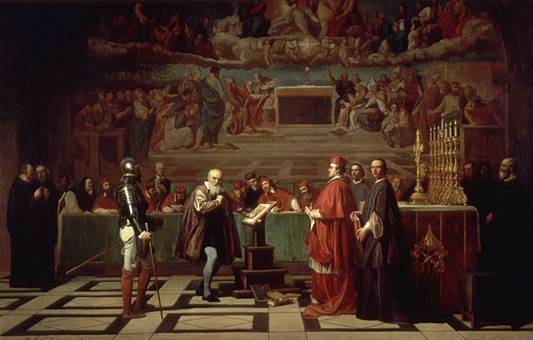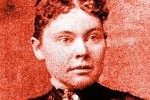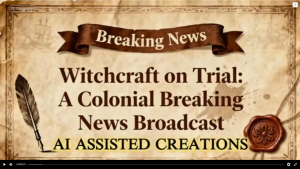February 13, 1633 was the final day of the trial led by the Holy Office. Galileo once again walked into the same dim, candle-lit room in one of the beautiful churches of Rome. The eyes of the paintings, statues, and members of the Holy Office judge him as he entered. He alone was the center of attention. Guards watched over his shoulder, ensuring that he would have to face his fate one way or another. Seeing Cardinal Francesco, Galileo knew there might just be a sliver of hope.1 If he was fortunate, he would be a free man and would finally be allowed to publish his work. But hope was slim for those who speak against the teachings of the Church and expect to get away with it. Galileo was now facing trial for heresy against the Catholic Church, as he was spreading “false” information about the center of our universe with his heliocentric theory.
Astronomer, mathematician, and physicist, Galileo Galilei had quite the knack for stirring up trouble. Born February 15, 1564 in Pisa, Italy, he was not afraid to proudly speak up for what he believed in.2 Just like other scientists, he was passionate about his work. Galileo had become a fierce opponent of the Aristotelian philosophy that dominated the universities, and he openly criticized Aristotle. Since he had never finished college, those who were educated and champions of Aristotle’s philosophy often looked down on him and thought of him as a buffoon.3 This treatment would continue even when Galileo became a professor (without finishing college still). Although it was one of his first experiences being looked down upon, it would not be his last.

First introduced in the sixth century BCE, heliocentric theory claimed that the sun was the center of our universe, directly contrary to the geocentric view that claimed that the earth was its center.4 This heliocentric idea had been discussed among astronomers and philosophers for centuries, but was simply dismissed because of the reigning geocentric view, based on the work of the ancient astronomer Ptolemy. It was not until Nicholas Copernicus published his book De revolutionibus in 1543 that there was a mathematical way to propose this new way of observing our place in the universe. Knowing the dangers of Copernicus’ work, Andreas Osiander included a preface that implied the new system was merely a hypothesis and nothing more.5
So, when Galileo openly claimed to believe in Copernicus’ ideas in 1604, he immediately put himself on the radar of the church.6 Thankfully, he had deep relationships and important friends within the church, especially among various cardinals and priests. More specifically, he was good friends with Cardinal Maffeo Barberini, who often vouched for him with the Holy Office and with Pope Paul V himself.7 Galileo would get away with speaking and teaching the ideas of heliocentrism for now. This time, his relationships kept him from facing condemnation by the church.
Under the motivation from fellow astronomer Johannes Kepler, Galileo decided he would begin to push back at the church.8 Although he was a Catholic himself, he was tired of the church always having the final word.9 He was tired of having to conform his celestial observations to a literal interpretation of the Bible. As a philosopher, he began to think of just how he could find a way around geocentric interpretations of Biblical passages without being seen as attacking God Himself. Knowing he would have to dig deep into the Bible to build a valid argument, he used his contacts in the church to help him once again. With the help of Monsignor Piero Dini and Father Bendetto Castelli, he was able to write various essays in which he essentially argued that the scriptures are meant to teach lessons. The scriptures were true, but oftentimes the imagery of scripture was used simply to convey spiritual meaning, not actually to describe the physical world scientifically.10 Galileo claimed that the Bible, in its entirety, was not meant to be interpreted literally in all places at all times. With his patience running thin, Pope Paul V ordered the Holy Office to begin investigating Galileo. Not even Cardinal Maffeo Barberini could convince the pope otherwise. Galileo would no longer be stirring up trouble, as on February 19, 1616, Copernicus’ De revolutionibus would be banned, and Galileo would secretly be ordered to stop teaching and defending Copernicus in anyway.11 Once again, the church shut down ideas contrary to theirs.
Galileo decided to let his case rest, following the 1616 trial. As much as he had a fire in him to prove his ideas right, he was unable. While he was not formally charged, he was constantly under a microscope. Galileo had to be careful of what he taught and wrote.12 Especially with Pope Paul in charge, there was not much he could do. Being as smart as he was, Galileo knew that hope was not lost. Since he was not formally punished, all he had to do was play the waiting game. Eventually, Pope Paul would have to step down or pass away, and Galileo would then be in the clear. Anxiously, he waited until he could finally begin working on his ideas again.

After waiting seven years, Pope Gregory XV died and his old friend Cardinal Maffeo Barberini was elected Pope in 1623. The waiting game had finally paid off for Galileo, or so it seemed. Knowing Galileo’s troublesome nature, Pope Urban VIII (Maffeo) called Galileo to Rome to have a few meetings with him. Ecstatic over his new-found opportunity, Galileo rushed to Rome to get the green light from him. He would then have six different meetings in which Galileo would try to get a pass, but Pope Urban would not give him one. Despite this, Pope Urban told Galileo that as long he kept his work theoretical, as Copernicus had, he would not have issues with the church any longer.13
With his motivation back, Galileo decided to ignore the warnings of his friend. He would spend the following six years working on the mathematical proof demonstrating that the earth was not the center of the universe. After being silenced for what was an eternity, Galileo refused to be silenced any longer. In January of 1630, his hard work paid off as his book was finally completed.14 Titled Dialagoue of the Two Chief World Systems, publication was the only step left. While the final copy was being worked on, Father Castelli informed Galileo of an old conversation he had with Pope Urban. During the 1616 trial, Pope Urban (then a cardinal) told Father Castelli that if he were pope, Copernicanism would never have been banned. The recent conversations Galileo had had with the pope ran fresh in his head and to him, this was a sign that he would be able to get away with publishing his work. On top of this, he also learned he was also well liked by the Pope’s theologian Nicolò Riccardi.15 Everything was finally falling into place for the hard-headed astronomer.
Yet, publishing his book would be troublesome on his own. Even though he was only informally punished back in 1616, his troublesome reputation stuck with him. Printing Galileo’s findings would be risky even for the most reputable printer. To get his book printed, Galileo would include a “submission clause” giving the illusion that he was in line with the church’s orders in the introduction and conclusion. It took another two long years to finally get his book published.16

Galileo had finally accomplished his goal of circulating his work. His already household name now guaranteed himself a place in history books. As beloved as he was by many of the high church members, a few were set to get him to quit his actions. Someone had convinced Galileo’s dear friend Maffeo that he was trying to embarrass him by publishing his work.17 Once again, he found himself in Rome facing trial. Already let off with a warning, hope was beginning to look bleak for the astronomer. His friends could no longer help him as a prominent subgroup of the church were out for Galileo’s head. Not even Cardinal Francesco (nephew of the pope) who wanted Galileo to once again be free, could change a thing. Anything less than condemnation would not be tolerated.
His enemies’ success came on February 13, 1633, as Galileo was officially condemned.18 His work would be placed on the list of banned reading. On top of this, he was sentenced to house arrest for the rest of his life. Here he continued to accept secret visitors against the orders of the church and further his scientific work. He passed away in Florence, Italy on January 8, 1642. The church had finally silenced the cunning astronomer.
As much as it seemed that the church got the last laugh, Galileo had the last laugh up in the heavens. Nearly 300 years later, in 1983, Pope John Paul II declared that the church had made an error in condemning Galileo. He essentially used Galileo’s original argument that the Bible does not always describe the physical world, and that the Bible holds both literal and figurative interpretations.19 Galileo never wanted the church to look bad or go against it. He was simply seeking the truth of the nature of our universe. According to Galileo, the truths of scripture, when properly understood, do not conflict with the truths of science.
- Ernan McMullin, The Church and Galileo (Notre Dame: University of Notre Dame Press, 2005), 63. ↵
- Encyclopedia of Science and Religion, 2003, s.v. “Galileo Galilei,” by William R. Shea, 349. ↵
- New Catholic Encyclopedia, 2003, s.v. “Galilei, Galileo,” by J.J. Langford, 59. ↵
- The Gale Encyclopedia of Science, 2008, s.v. “Heliocentric Theory,” by K. Lee Lerner and Brenda Wilmoth Lerner, 2096. ↵
- New Catholic Encyclopedia, 2003, s.v. “Galilei, Galileo,” by J.J. Langford, 59. ↵
- Encyclopedia of European Social History, 2011, s.v. “Galileo Galilei (1564-1642).” ↵
- New Catholic Encyclopedia, 2003, s.v. “Galilei, Galileo,” by J.J. Langford, 62. ↵
- J.L. Heilbron, Galileo (New York: Oxford University Press, 2020), 112. ↵
- Encyclopedia of European Social History, 2011, s.v. “Galileo Galilei (1564-1642),” 113. ↵
- Joseph D. Bryne and Arthur R. Sienburg, “Galileo Willfully Violated the Injections of the Inquisition and was thus Guilty at his 1622 Trial,” The High Middle Ages to the Modern World, no. 3 (2011): 241. ↵
- New Catholic Encyclopedia, 2003, s.v. “Galilei, Galileo,” by J.J. Langford, 61. ↵
- Joseph D. Bryne and Arthur R. Sienburg, “Galileo Willfully Violated the Injections of the Inquisition and was thus Guilty at his 1622 Trial,” The High Middle Ages to the Modern World, no. 3 (2011): 225. ↵
- Encyclopedia of Science and Religion, 2003, s.v. “Galileo Galilei,” by William R. Shea, 62. ↵
- Encyclopedia of Science and Religion, 2003, s.v. “Galileo Galilei,” by William R. Shea, 351. ↵
- Encyclopedia of European Social History, 2011, s.v. “Galileo Galilei (1564-1642),” 113-114. ↵
- New Catholic Encyclopedia, 2003, s.v. “Galilei, Galileo,” by J.J. Langford, 62. ↵
- New Catholic Encyclopedia, 2003, s.v. “Galilei, Galileo,” by J.J. Langford, 62. ↵
- Encyclopedia of Science and Religion, 2003, s.v. “Galileo Galilei,” by William R. Shea, 351. ↵
- Encyclopedia of Science and Religion, 2003, s.v. “Galileo Galilei,” by William R. Shea, 351. ↵



137 comments
Maria Esquivel
I found this article even more interesting the second time. Galileo never wanted to make the Catholic church look bad or go against its belief, however, the church believed he was going against the church. I still can’t fathom how Galileo had to spend the rest of his life under house arrest, and that his work was banned just because his theory was not accepted by the Catholic church. This article provided great information on Galileo’s life and what he thought of the nature of the universe. It was incredibly well-written and informative.
Noah Laing
I’ve always heard of Galileo but have never really learned about what his significance in history was, but after reading this informative article I was amazed to see the stand that Galileo took against the Catholic churches teachings, given that at that time rebellion against the Catholic church wasn’t common from individuals. It was also interesting that Galileo believed the correct understandings of the scripture and science go together, which I believe. Overall, this was a well written and informative article.
Rafael López-Rodírguez
I’ve heard about the story of Galileo when I was in high school but do not remember going to much in depth about it. For these times it was crazy to think that if you contradicted the beliefs of the catholic church you were seen as a sinner. Either you believed in what the church said or else. Galileo showed no fear when it comes to what he believed in and did not care the consequences that brought him. I like how this article focused on his work. Good article!
Tyler Sleeter
Still a great article. It seems that the Catholic Church was able to control scientific knowledge for far too long in history. The Church wanted to control the information that was published and taught in order to ensure that people followed the teachings of the Church. However, it was not long until scientists like Galileo had to get the truth out to the people. The fact that Galileo used the help of his priest friend as a way to get his information out is interesting to me. The movement from a belief in geocentrism to heliocentrism is important to understanding the universe and it is a shame that Galileo was punished for trying to spread this information.
Natalia Flores
This is my second time reading this article and it still astounds me that the Catholic Church really did try to control Galileo and pressure him into not spreading his theory. It really does seem like something that shouldn’t be that big a deal, in my opinion, but at the time where the Church was seen as a government like organization, it makes sense. It’s still mind blowing that the Church didn’t pardon Galileo till 1983…why did it take so long for them to admit that?
Hector Garcia
Galileo Galilei was a major contributor or even the founder of some of the sciences that we see today. His take on how the Earth was rotating around the Sun rather than the Sun revolving around the Earth was past ahead his time. It sorts of pisses me off that his ideas were dismissed because the Church didn’t agree with them. Overall, this article was interesting and I understand why it was nominated for three different categories.
Edgar Ramon
It’s a great thing that Galileo stuck to the truth. And I also think that the Bible has pieces that are not literal, but can be read literally when you’re young. As you mature you should dive into how complex the contents of the Bible can be, and they point you to truth, ofcourse most of this truth you must find yourself. Galileo found truth in that the Heavens weren’t a place with angels walking around, and God sitting there on a throne, but more uncharted places and things. Does this disqualify God? No, and even if everyone stood against Galileo it is better to speak the truth than to let it die in darkness.
Miguel Camarillo-Cohen
This article was very interesting and insightful. It gave a complete new sense of how science and religion can come together rather be in complete conflict with one another. Galileo’s math proved in the earth was not the center of the universe. According to the article, perhaps one of his most important contributions was that Galileo sought the truth of the nature of our universe. He argued that the truths of scripture, when properly understood, does not conflict with the truths of science.
Suvesh Vasal
I do not believe that Galileo gets as much support as he deserves. I mean standing up to the church?? that is crazy for someone to do back then. And he was not doing it as an act of defiance. He wanted people to know what he thought and believed and there is nothing wrong with that. This article was immensely detailed and fun to read. I had never really been interested in Galileo but this article makes me think much more highly of him.
Saira Castellanos
I wonder how the world would have ended up if Galileo just said, “eh, i guess i will just give up now, there’s no point in trying.” He was very brave and the article portrays this so well. So many people did not get what they desevred in their lifetime, but get it after they are gone. I hope Galileo knows the huge impact he has left on the world, and that his name is very important. Maybe wouldnt be so advanced as we are now in science and astrology. Great article.